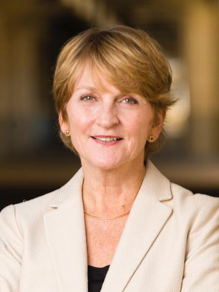
Pamela Matson
Dr. Pamela Matson is an interdisciplinary sustainability scientist, academic leader and organisational strategist. Her research addresses a range of environment and sustainability issues, including sustainability of agricultural systems and vulnerability and resilience of particular people and places to climate change. With multi-disciplinary teams of researchers, managers and decision-makers, she has worked to develop agricultural approaches that reduce environmental impacts while improving human wellbeing. She served on the National Academy’s Board on Sustainable Development in the 1990s and co-wrote the NRC volume Our Common Journey: A transition toward sustainability. She was the founding chair of the National Academies Roundtable on Science and Technology for Sustainability, and founding editor for the Annual Review of Environment and Resources. She serves on advisory boards for Arizona State University’s Global Institute of Sustainability and the University of Vermont’s Institute for the Environment, and co-directs the Leopold Leadership Program at Stanford University. Her recent publications (among nearly 200) include Seeds of Sustainability: Lessons from the Birthplace of the Green Revolution and Pursuing Sustainability. Dr. Matson is an elected member of the National Academy of Science and the American Academy of Arts and Sciences and has received a MacArthur Fellowship, among many other awards and recognitions. In addition to her roles in sustainability science, she has served on numerous National Academies’ committees, including the the Board on Global Change, and the Committee on America’s Climate Choices. She also served on the science steering committee for the International Geosphere-Biosphere Program, and jointly received the Nobel Prize for her contributions to the IPCC. She is a past President of the Ecological Society of America, serves as vice-chair of the board of the World Wildlife Fund, on the boards of the ClimateWorks Foundation and the California Academy of Sciences and several university advisory boards.